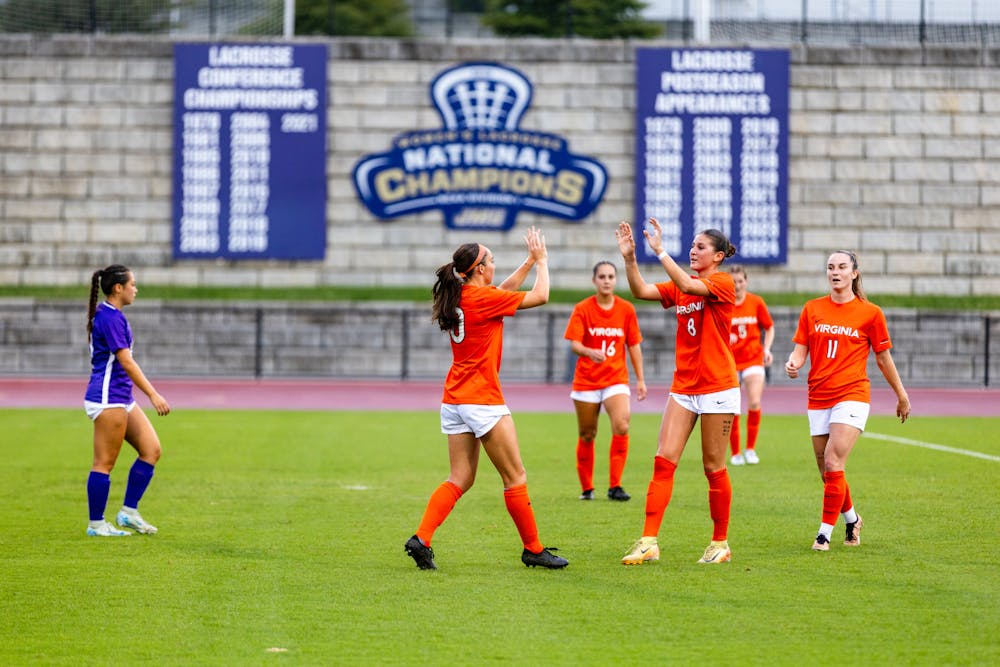Virginia women’s soccer missed the NCAA Tournament for the first time in 30 years last season, but it is back in the spotlight as a No. 4 seed for the 2024 edition. The Cavaliers will look to shake off their absence from the ACC Tournament when they host Princeton Friday night in a first-round game at Klöckner Stadium.
Virginia’s short-term focus will be on this week’s game against the Tigers, but to attain national glory, Coach Steve Swanson’s team will have to win six consecutive matches over the next few weeks. A lot has to go right for that to happen.
Virginia’s recipe for success
If the Cavaliers want to go anywhere in the national competition this year, they will have to rely on their stout defense. Virginia kept a shutout in nine of its 17 regular season games, conceding just one goal per match — tied for seventh-best in the ACC.
Graduate defender Moira Kelley has proved to be an excellent transfer acquisition alongside senior defender Kiki Maki and junior defender Tatum Galvin, who also play centrally along the back line. All three players have appeared in every game this season, and their shot-blocking will be critical to keep the pressure off sophomore goalkeeper Victoria Safradin.
Additionally, senior defender Laney Rouse will need to use her speed and dribbling prowess to progress the ball when opponents are pressing. Her passing range will also be important in starting counterattacks and adds a pinpoint threat in the transition.
On the goal-scoring side, freshman attacker Sophia Bradley should continue to add a spark to the Cavaliers’ wing play. She is an addition to an already solid unit composed of sophomore forward Allie Ross and junior forward Maggie Cagle, who have combined for 11 goals and seven assists in 2024.
Through the middle, junior forward Meredith McDermott will be crucial for Virginia. McDermott has contributed four goals and two assists in her last six appearances, and seeing as clinical teams will have the upper hand in the NCAA Tournament’s single elimination format, the junior’s composure in the final third figures to be much-needed.
Yet it is the engine in the midfield that will be the difference this November. Senior midfielder Lia Godfrey’s physicality, sophomore midfielder Yuna McCormack’s drive forward and graduate midfielder Alexis Theoret’s poise on the ball will all need to be working seamlessly together to control the flow of the upcoming matches.
Possible tournament path
The Cavaliers will start with Princeton, who earned an automatic bid to the tournament after winning the Ivy League championship with a 2-0 victory over Brown last week. The Tigers have not lost since Oct. 13 against Yale and currently boast a six-match winning streak, a period during which they have outscored opponents 15-3.
Although Virginia and Princeton have yet to face each other this season, games against common opponents may shed some light on what the Cavaliers should expect from the Ivy League’s finest outfit.
Both sides were able to come out on top against Miami, but while the Tigers eked out a win at home in their opening game of the season, Virginia won by a decisive two-goal margin in Coral Gables, Fla. Furthermore, in matches against No. 4 seed Penn State, the Cavaliers’ impressive comeback win on the road in August outshines Princeton’s 1-0 loss at home to the Nittany Lions in September.
The first-round matchup has the potential to offer some problems on the defensive end for Virginia. The Tigers’ junior forward Pietra Tordin has racked up an impressive nine goals on the season, including a hat trick in an eight-goal victory against Brown Oct. 5. But the Cavaliers have played much stronger attacking lines than Princeton will roll out, and in front of a home crowd, Virginia will like its odds of coming out on top.
If the match against Princeton goes the Cavaliers’ way, their next opponent would likely be No. 5 seed Wisconsin, who is hosting Maine Friday night. The Badgers have allowed only 16 goals all season, but this matchup is another good one for Virginia — Wisconsin is 1-3 against ranked opponents this season and will have to travel to Charlottesville if it advances past the first round.
A second-round victory would send the Cavaliers to the round of 16, where they would expect to encounter a road matchup against No. 1 seed Southern California. Virginia will be pushed to its limits if this game happens — the Cavaliers would have to endure a long flight out to the west coast with only two days to recover from the second round, plus, the Trojans have only tasted defeat in regulation once this season.
Southern California allows its opponents fewer than eight shots per game, so Virginia will have to take its chances and play well without the ball to secure a win in this prospective third round game Nov. 24.
Even if the Cavaliers overcome the odds to get to the quarterfinals, it seems all too likely that their past woes against ACC competition will rear their head once again. No. 2 seed Wake Forest, who won big over the Cavaliers early in conference play, is the most likely quarterfinal opponent.
The Demon Deacons’ dynamic attack caused major problems for the Virginia defense a couple of months ago, so a standout performance on both sides of the ball would be necessary for the Cavaliers to skate by with yet another upset.
However, it is the NCAA Tournament, and anything can happen. After peaking as the No. 2 team in the nation in mid-September, the Cavaliers have proven that they are talented enough to compete with anyone. The path to the College Cup in Cary, N.C. will be a tough one for Virginia, but hope remains that it can get there.
Their tournament run begins Friday evening against Princeton at Klöckner, with kickoff set for 7 p.m.







